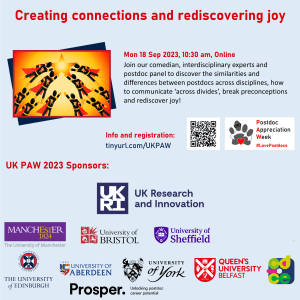Your development matters!
Focus on
Supporting researcher career development – Research Staff Development Fund (RSDF)
Applications for the Research Staff Development Fund (RSDF) are now invited. The RSDF supports Research Associates, Senior Research Associates, and Research Fellows in implementing initiatives to enhance collaboration and communication within research teams.
As part of the University’s commitment to researcher career development, applicants can request up to £400 for activities such as specific development initiatives, networking, and conference travel. Preference is given to proposals benefiting multiple individuals and focusing on transferable skills, leadership development, morale improvement, local practices enhancement, communication, and collaboration.
Applications, due by Friday 1st March, can be submitted online. The RSDF does not cover staff time or project-specific conference travel
Upcoming workshops
Places are now available on the following workshops:
- 20 February 10:00-12:00- Thriving in a Part-Time Role
- 20 February 11:00-12:00- An introduction to Public Engagement with Research: involving the public in your research
- 26 February 09:30-12:00- Discovering Career Support for Researchers at Bristol
- 27 February 10:00-11:30- Intro to Research Funding [Sci+Eng]
- 27 February 09:30-12:00- Managing Research Teams (in person)
- 28 February 14:00-15:00- Intro to Research Funding [Health and Life Science]
- 28 February 09:30-13:00- Healthy and Sustainable Productivity Habits- Part 1
- 29 February 09:30-12:30- Working Towards a Lectureship- in person
- 05 March 14:00-15:00– Closing Down a Research Project
- 12 March 11:00-12:00- Introduction to Research Ethics
- 13 March 10:00-12:30- Working Towards a Fellowship [Arts & SSL]
- 13 March 11:00-12:00- Recruiting Research Staff
To book, please sign in to Develop now and search the catalogue for these course titles. To book a place when registration has closed, please email sd-course@bristol.ac.uk
To see a full list of Bristol Clear and Research in Practice workshops, please see our webpage.
Research-related events and initiatives
Bristol Women’s Mentoring Network 2024 – Call for Mentees and Mentors
Supporting academic and professional services colleagues, we are launching a new round for 2024. We are inviting:
- New mentees (academic or professional services women or individuals who identify as female, grades J, K, L and M) to apply
- New mentors (anyone from academic, professional services & University of Bristol Alumni, grades K, L, M & X).
- Returning mentors can express their interest by emailing uob-mentoring@bristol.ac.uk.
Please visit Bristol Women’s Mentoring Network for more details. Please circulate to any colleagues who may be interested.
Sign up to information sessions on Develop
Community Fellowship Opportunity – From the Personal to the Planetary: Interaction, Activism and Futures
The Brigstow Institute and Cabot Institute for the Environment are collaborating on an initiative called From the Personal to the Planetary: Interaction, Activism and Futures. The initiative seeks to activate a broad range of people and stakeholders in considering climate change and responding to the climate emergency.
- Deadline: 10:00am, 19th February 2024
- Funding available: £5,000 per fellowship (VAT inclusive)
- Number of fellowships available: a total of eight P2P Community Fellowships positions (four academic fellowships drawn from the University of Bristol only, four fellowships for those beyond the university)
- Timescale of fellowships: fellowships begin June 2024 for 10 months with some flexibility.
Find out more about the fellowships and application process: https://www.bristol.ac.uk/brigstow/funding/p2pfellowships/
EBI Director Role- Applications open
The University is seeking to appoint a Director of the Elizabeth Blackwell Institute. This is an opportunity for an existing member of staff within the University to lead the Institute when the current Director ends her term of office on 31 July 2024. The role has a 50% FTE time allocation in which the post-holder is released from School and Faculty duties by agreement with their Head of School. Further details including Job Description and how to apply can be found on the University job pages here.
Closing date for applications: 23:59 GMT on Monday 26 February 2024
Collaborating with the NHS and the future of healthcare: An Enterprise Masterclass with Maria Kane, OBE
Join Maria Kane, OBE and Chief Executive of North Bristol NHS Trust for the next Enterprise Masterclass. Maria will share insights on agility, innovation, and collaboration within large organizations like the NHS. She will delve into the impact of AI and digital technologies on healthcare and offer practical advice for academics seeking to collaborate with the NHS.
Secure your place via Develop and feel free to share this invitation with interested parties.
For inquiries, contact claire.wrixon@bristol.ac.uk. External attendees should also contact Claire to reserve their place.
This retreat offers Research Associates and Senior Research Associates without an established position at the University of Bristol a chance to focus on career development and connect with peers. Through two days of workshops, participants will clarify their goals, gain confidence, and identify actions to advance their careers. Priority will be given to those facing barriers, including those impacted by Covid-19, and applicants from Black heritage backgrounds. Interested individuals should email Claire Wrixon (Claire.wrixon@bristol.ac.uk) with a 1-page expression of interest. Expenses, including travel and childcare up to £150, can be claimed via the school budget, see the expense policy. Limited spaces available; allocation will be via lottery if oversubscribed.
Invitation to attend Arts, Law and Social Sciences health & social care research networking event on Tuesday 27 February 2024
You are invited to an interdisciplinary networking event hosted by the Elizabeth Blackwell Institute. This will be an opportunity for health and wellbeing researchers across the university who adopt social sciences, arts and humanities research methods to get together, learn about current research at Bristol in this space, find out what expertise is available and make new connections. The networking event will be held in-person over lunch on Tuesday 27 February 2024, 12:00 – 14:00, in the Arts Complex, Humanities Cinema Room G.H01, 7 Woodland Road. Light lunch will be provided in the Research Space on the first floor above G.H01 and participation is free. To register please complete a short registration formby midday on Monday 19 February 2024. Full details and agenda can be found here.
GW4 Event- Tuesday, 12th March
Join the GW4 team at the Claverton Rooms, University of Bath from 13:00- 15:00 on 12th March 2024 for an informative and engaging session, where you can learn more about GW4’s strategic priorities, programmes of work, funding schemes and the audience groups who they work with and support. For further information see https://gw4.ac.uk/events/gw4-roadshow-2024-university-of-bath/
Free lunch and refreshments will be provided.
Please register to attend by 5th March 2024.
The Elizabeth Blackwell Institute Lunchtime LINKS
Join The Elizabeth Blackwell Institute (EBI) for their upcoming EBI Lunchtime LINKS sessions, designed to foster learning, innovation, networking, knowledge sharing, and support among researchers. Their next session will focus on integrating public engagement into research projects, featuring a guest speaker and Q&A session. Join them on Wednesday, 13th March, from 12:00 to 13:30 at the Verdon Smith room in Royal Fort House. After the talk, enjoy a light lunch and networking opportunities with peers and representatives from EBI and the Division of Research, Enterprise, and Innovation (DREI). Visit the EBI Events page for more details and to sign up. Stay updated on future EBI LINKS sessions through our intranet site.
SWIMM Programme
The SWIMM (South West Institutions’ Middle Manager) programme is a 2-day residential programme involving up to 7 other universities from the southwest of England and Wales. SWIMM is designed to allow ‘middle managers’ the opportunity to reflect on their role, develop key management skills and network with peers in similar roles across the sector. Delegates learn tools and concepts in a supportive atmosphere, away from the workplace. The programme is aimed at Academic and Professional Services staff who are ‘middle’ managers and who are new to their role or who wish to further develop their management skills.
Programme dates: Thursday 14th March & Friday 15th March 2024
For further details and information for how to apply, please click this link to the SWIMM webpage.
Training from other providers
Research Lives and Cultures Podcast
Join Dr. Sandrine Soubes from Tesselle Development as she interviews researchers, academics, and professionals about their journeys through research careers and professional transitions on our podcast. These stories highlight the diversity of approaches in navigating the complexities of the research environment, demonstrating that there is never a set path for research careers.










